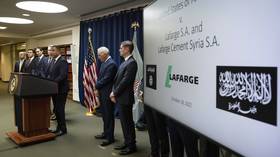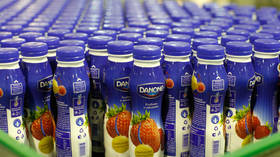How Washington extracts billions from foreign companies with overreaching court cases

The US government is outraged that the French cement giant, Lafarge, has admitted to wheeling and dealing with terrorists in a war zone, paying $6 million to Al-Qaeda and Al-Nusra jihadists in Syria. Nothing that a fine of nearly $800 million leveled against it by Washington can’t fix, apparently. But why is the US never held accountable for similar schemes?
Lafarge’s factory between Aleppo and the Turkish border had just opened in the year prior to the conflict in Syria popping off in 2011 – yet another Western proxy war in an energy-strategic state. Western-backed “Syrian rebels” ultimately failed to oust President Bashar Assad, all while jihadist groups flooded the zone to exploit the chaos. So how does a company keep operating in an active war zone? By paying off jihadist groups on the battlefield where it’s trying to run a business, apparently. Lafarge, which merged with the Swiss multinational Holcim Group in 2015, just pleaded guilty in the US earlier this week to what’s characterized as a sort of employee and executive protection scheme, agreeing to pay a fine of $777.8 million to the US Treasury, marking the first time a company has been convicted in the US of backing terrorists.
“In the midst of a civil war, Lafarge made the unthinkable choice to put money into the hands of ISIS, one of the world’s most barbaric terrorist organizations, so that it could continue selling cement,” said US Attorney Breon Peace for the Eastern District of New York in a statement. “Lafarge did this not merely in exchange for permission to operate its cement plant – which would have been bad enough – but also to leverage its relationship with ISIS for economic advantage, seeking ISIS’ assistance to hurt Lafarge’s competition in exchange for a cut of Lafarge’s sales.”
So in return for France cheating on the global playing field, the US government leveraged its power through its Foreign Corrupt Practices Act (FCPA) to deliver a competitive blow of its own. Lafarge is also under indictment in France, but what’s a French company doing on trial in a US court? Well, the US – unlike other countries – has a history of actively seeking to use its justice system as a blunt instrument against foreign competitors – which it can do as long as a foreign company is involved in any way with Wall Street, or the US dollar, or even an American server.
French companies have been targeted multiple times by the US DOJ, but some top-level French executives admit privately that you have to be pretty naive to think that this sort of practice is rare or limited to France. They also feel that targeting by the US Justice Department is highly selective. It’s not hard to understand why. Executives of French multinational Alstom, for example, were accused by the US of corruption, threatened with prison sentences of up to 15 years, and the end result that squared everything away was the payment of $772 million in criminal penalties to the US government and the sale of France’s industrial crown jewel – Alstom’s nuclear power know-how – to Pentagon contractor, General Electric. British company Amersham was acquired by GE as it contended with charges of kickbacks to Iraq in order to obtain contracts under the UN Oil for Food Program. France’s Societe Generale bank paid $585 million in 2018 to settle what the DOJ called a “multi-year bribe scheme in Libya.” And French energy giant, Total, paid nearly $400 million in fines to US coffers in 2013 to settle charges related to business activities in heavily sanctioned Iran.
The Swedish telecom company, Ericsson, paid $1 billion to the DOJ in 2019 to avoid prosecution for an alleged 17 years’ worth of corruption spanning between 2000 and 2016 from China to East Africa. Last year, it was accused of a breach during its three-year US court-mandated “compliance monitoring” period of greater transparency into the major US global competitor.
It’s not like Washington doesn’t also support jihadists, er, “freedom fighters,” in war zones around the world from Latin America into Africa and the Middle East – and even specifically in Syria. The Western press has pointed out that the Western-backed Syrian opposition ultimately merged with Al-Qaeda. And who paid to train and equip these “moderate Syrian rebels,” at least some of which ended up as Al-Qaeda recruits? The same Uncle Sam – via the CIA and the Pentagon – who vowed to hunt down terrorists after holding Al-Qaeda directly responsible for the attacks on US soil on September 11, 2001. We’re talking billions of US taxpayer dollars that ultimately ended up training jihadists. And no one’s taking good old Uncle Sam to court over that. And before anyone argues that a government intelligence operation is different from corporate actions, a French military intelligence document obtained by the country’s press last year noted that the spy agency was aware from 2014 of Lafarge’s payments to jihadists.
So the French and American methods may be different, but the end result is the same. But it’s amusing to witness Washington publicly clutching its pearls as it extracts hundreds of millions of dollars from a competitor to cushion its fainting spell from its delicate moral sensibilities being so deeply offended.
The statements, views and opinions expressed in this column are solely those of the author and do not necessarily represent those of RT.















